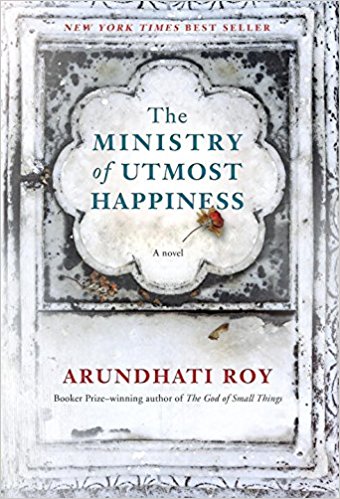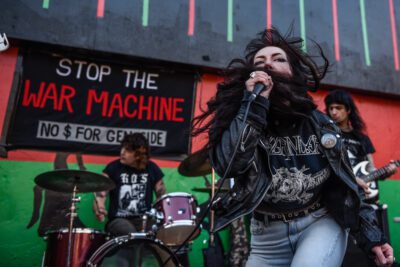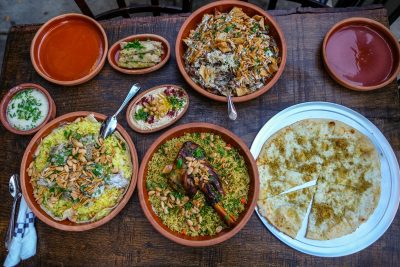Interview with 2018 NBCC Fiction Award Finalist Arundhati Roy
For the past four years, the National Book Critics Circle has partnered with The New School’s MFA Creative Writing program, allowing the students to interview each of the NBCC Awards Finalists. In addition to building excitement for the Awards Finalist Reading and Ceremony held at the New School March 14th-15th, these interviews have built an intergenerational bridge between the writers of today and tomorrow.
This year, as part of the ongoing collaboration, and in support of the NBCC’s conversation about reading, criticism, and literature that extends from the local to the national, Brooklyn Magazine will publish and promote the interviews between NBCC Finalists and the current students of The New School.
To his shock, the landlord and college friend of Tilo, Garson Hobart discovers photos and documents that she has been keeping for Musa. Does this discovery mark the awakening moment for him, or does it come later, when he is organizing the files for her?
I wouldn’t say that Garson Hobart has an “awakening moment” as such. He’s a very astute man, long committed to amorality. In a way, he knows as much about Kashmir as Musa does—from the opposite end of the viewfinder. In these matters, he’s a man who’s hard to surprise. For example, he knows about Major Amrik Singh and his trail of blood. He knows how the government helped him leave the country rather than risk being exposed as an accomplice to his crimes. The chink in Hobart’s armor is not ignorance of any kind—it’s Tilotamma. And when he begins to look through her weird archive, what increasingly shocks and unnerves him is that it’s her archive. It’s her perspective that destabilizes him more than the files and photographs and documents, more than any kind of actual “evidence” that he comes across. What shocks him is not the discovery of Amrik Singh’s crimes, but the fact that Tilo had been tracking him over so many years.
On the night of their reunion, Musa tells Tilo how history began for him. When did history begin for you?
This does not happen on the night of their reunion. Its Tilo’s memory of their student days—she remembers Musa saying this to her in 1984 on the day Maqbool Butt, the co-founder of the Jammu and Kashmir Liberation Front, was hanged for treason in Delhi and buried in the prison grounds. She remembers how deeply Musa was affected by it more vividly than she does the actual implications of the hanging. The hanging meant little to most Indians then, but for many Kashmiris, it marked the beginning of the militant phase of their freedom struggle.
When did history begin for me? It’s hard to say. There wasn’t a particular moment. But I imagine it began with my first, inchoate, attempts to understand the injustice I saw and sensed all around me. Why was my mother’s own family so cruel to her just because she was divorced? Why would nobody invite us to their homes? Why was I punished for speaking in Malayalam and not English? Why were certain people whom I loved dearly not allowed into my grandmother’s house in the village? Why did the heroine get raped in almost every Malayalam movie that I saw as a child? How is it acceptable for some human beings to think of others as “untouchable”? That sort of thing. Also growing up in Kerala meant that we saw huge Communist processions every day. The air was full of the talk of workers’ rights, the history of oppression, and the coming revolution.
Many characters in the novel try to rewrite, or at least, edit their personal history. Even the documentary crews, in their self-claimed objectivity, edit the footage according to their script. Is this novel your effort to leave a testimony to what has happened during the past two decades?
Objectivity is pretty much a posture, is it not? Quite often, even in courts of law, editing is everything. Or almost everything. What we choose to see and what we choose to unsee, to turn away from. The things about ourselves we choose to include and what we choose to exclude. Sometimes to suit ourselves; sometimes to please others. Anjum edits the story of her life into a bedtime tale, leaving out the sadder, harsher parts, so that it comforts Zainab, the foundling she adopted.
As to your question about testimony—when I was writing, I wanted to write a novel, and not use the form of a novel to do something else. To my mind, a novel should be more than a testimony. My effort was to write a novel that could only be a novel. Not a novel that wanted to be a movie. Not a manifesto masquerading as a novel. A novel as a thing in itself, nothing else.
A novel is a secret pact between the writer, the protagonists in the story, and the reader. And every reader, like every visitor to the dargah of Hazrat Sarmad, will come away with their own version of the book, their own secret conversations with the characters. It’s a very intimate, private affair really. Some may read it as a testimony to the times, to the politics of the times. Others as an ode to myriad and unexpected forms of love, to hope, to madness, to language, to laughter, to landscape, to animals, to resistance, or—to complicate things—to the genius of a brutal, calculating administration dealing with a hellishly complicated people. Or all of this…
Something that cannot be fully contained, explained, and theorized about. It has to be and always will be—or should be—more than the theories and explanations that surround it. Always more than a sum of its parts. That’s what’s beautiful about [the novel]. It’s fragility and openness to interpretation is its strength.
Your sensitivity to the relationship between image and history reminds me of Susan Sontag and historians such as Andreas Huyssen. What were your influences in writing the book?
The influences were many. But I’d say that my training as an architect, my interest in urban planning, my long association with cinema—feature films as well as documentary—made me want to push the boundaries of what a novel can do. One of the methods of storytelling that has influenced me greatly is the narrative dance form called Kathakali from Kerala. That’s where I understood how to tell a shattered story. Not just by becoming everyone; but by becoming everything. That’s what those dancers do.
I felt absolutely free to be everything—unbearably intimate, unashamedly political, to write about a huge and ancient metropolis with as much familiarity as about a verdant war-torn valley, about birds and trees and animals as much as about human beings. To write a story in which the background sometimes becomes the foreground; a city becomes a character, and history kicks the door down in the middle of the night. To give every person and creature, even the most minor one, a name and a story, to not walk past anyone, and to not worry at all about frightening a reader with this mad offering.
To me, a novel is like creating a universe and asking someone you love to walk through it with you. I trust readers. And I absolutely and completely trust Anjum, Tilo, Saddam, Musa, Naga, and the others, even Garson Hobart. So I rolled the dice.
Tilo didn’t directly participate in the wars Musa was fighting, but she was burdened with grief and pain nonetheless. Could you talk a bit more about this “witness’s pain?” What does it mean to be a witness? What kind of role does the witness play, socially and historically?
Ironically, in Arabic, Persian, and Urdu, the word Shaheed can mean “witness,” as well as “martyr.” I think the Greek word martys also means “the person bearing witness.” It suggests that there is an osmotic membrane between bearing witness to war and participating in one.
Empathy, I believe, is a beautiful human quality. However, all witnesses are not necessarily empathetic to victims of violence and subjugation. For example, if you enter a torture facility at the invitation of a policeman and watch him torture somebody, you are contributing to the humiliation of the tortured person. That is why when the Ashfaq Mir, the Deputy Superintendent of the Shirz Interrogation Center, brings out a wounded militant as an exhibit for Tilo and Naga, Tilo instinctively turns away. She does not want to be a party to the prisoner’s humiliation—regardless of what his crimes may be.
However, Tilo’s part in the story is not limited to being the one who bears witness to other people’s pain. She has her own demons that she is fighting—hers isn’t a shooting, killing war, but a deeper, more insidious one. But dealing with that has given her a ferociously independent point of view, and a kind of suicidal honesty that cannot be papered over with forced flag-waving and hollow declarations of national pride. So, when it comes to Kashmir, she is not afraid of taking sides, of assigning culpability.
Her point of view is by no means the same as Musa’s. She’s a loner, a woman who lives in the country of her own skin. So, while Musa’s war is not, and can never be, Tilo’s, she is not some sort of compassionate missionary, absorbing other people’s pain vicariously. Her sense of justice and her love for Musa make place for solidarity, anger, and a complex, unusual understanding. And what she experiences at the hands of Amrik Singh, as well as being forced to watch the cold-blooded killing of Gulrez, folds her into the conflict in Kashmir in ways that make her more than just a witness.
There is a connection between Tilo and Anjum, though not necessarily on a personal level, given that there is not much interaction between them. But there is something about the Jannat, the paradise built by Anjum where the line between the living and the dead is blurry, that truly consoles Tilo. Could you talk a bit more about why the Jannat is therapeutic for her?
What connects them is freedom. The stubborn determination to live on their own terms—because they know no other way. They are like water on rock: they wear it down with their relentlessness. They are two separate centrifugal forces—Anjum and Tilo—who move inexorably toward each other. They are as different as can be. Anjum, a woman who can never have a baby, insists that she can, will, and eventually does.
Tilotamma, who can have babies, has absolutely no intention of being a mother. Anjum is wild, raucous and big-hearted. She builds a Guest House in a graveyard where she welcomes people she loves. Tilotamma is steely and quiet, and walks a thin line between sanity and insanity. She finds solace in Anjum’s Guest House because it’s the place where those who belong nowhere can belong. A community of un-belongers. A place where people have brought the shards of their broken hearts and pieced them together to make a mended heart. A place of rest for people who have walked in the valley of the shadow of death but have held on to their humor.
Tilo moves between two kinds of paradise. Kashmir—the paradise that is covered with graveyards where, as Musa says “The dead are alive and the living are only dead people pretending,” and the graveyard outside the walled city of Delhi gradually being covered by Anjum’s Jannat (Paradise) Guest House, where battered angels hold open the doors between heaven and earth, and the living and the dead mingle like guests at a cocktail party. Tilo feels consoled in this space where the dead are near at hand. Where Musa and Gulrez’s spirits are in another room in the house. Where death hangs around like an old friend.
It feels to me this is also a novel about language, questioning and challenging its ability to describe and assimilate violence, conflicts, gender issues, caste issues, etc. What is the biggest challenge for you in writing about these issues?
I could probably talk about the challenges of language in this novel for about three months continuously. Let me simply say that it’s a book that is imagined in several languages. Because, in cities like Delhi, that’s how we live here. If you stare at the language of the novel for long enough, you will find that, while on the surface it’s English, the shadowy forms of other languages glide around just below the surface.
The characters themselves often translate themselves to each other, in their letters, pamphlets, poems, and affidavits. I have spent the last few months working closely with the Urdu and Hindi translators. It has been an absolutely fascinating exercise. In June, I’ll be giving a lecture about this called “Found in Translation.”
As for the second part of your question— it’s important that we stop thinking about violence, conflicts, gender, caste, and so on as “issues.” These are not just issues. They are the very air we breathe day in and day out. Isolating them and developing ourselves into “experts” who function out of these sealed off silos is something we are encouraged to do—in academia, and in journalism, too.
It’s a way of controlling us, of breaking us down. But doing that—disconnecting these so-called issues from each other—can reduce them, make them more manageable. It can disallow a radical understanding. The Ministry of Utmost Happiness is not a novel about “issues.” It’s a novel about the air we breathe.
You might also like 



























